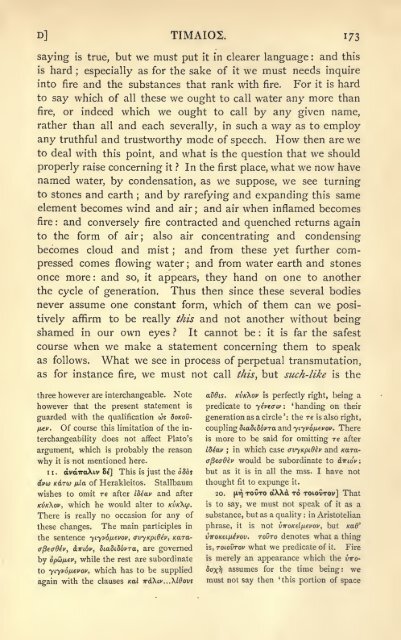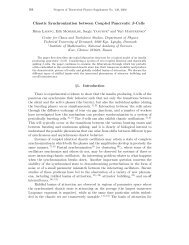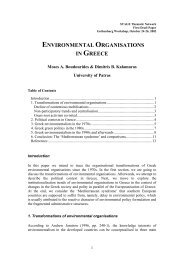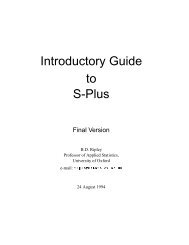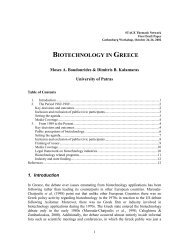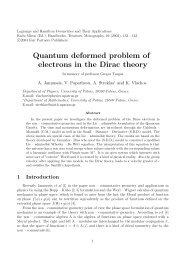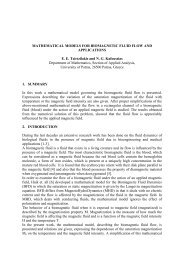Create successful ePaper yourself
Turn your PDF publications into a flip-book with our unique Google optimized e-Paper software.
D] TIMAIOS. 173<br />
saying is true, but we must put<br />
it in clearer :<br />
language and this<br />
is hard ; especially as for the sake <strong>of</strong> we it must needs inquire<br />
into fire and the substances that rank with fire. For it is hard<br />
to say which <strong>of</strong> all these we ought to call water any more than<br />
fire, or indeed which we ought to call by any given name,<br />
rather than all and each severally, in such a way as to employ<br />
How then are we<br />
any truthful and trustworthy mode <strong>of</strong> speech.<br />
to deal with this point, and what is the question that we should<br />
properly raise concerning it ? In the first place, what we now have<br />
named water, by condensation, as we suppose, we see turning<br />
to stones and earth ;<br />
and by rarefying and expanding this same<br />
element becomes wind and air ;<br />
and air when inflamed becomes<br />
fire : and conversely fire contracted and quenched returns again<br />
to the form <strong>of</strong> air; also air concentrating and condensing<br />
becomes cloud and mist ;<br />
and from these yet further compressed<br />
comes flowing water ;<br />
and from water earth and stones<br />
once more : and so, it<br />
appears, they hand on one to another<br />
the cycle <strong>of</strong> generation. Thus then since these several bodies<br />
never assume one constant form,<br />
which <strong>of</strong> them can we positively<br />
affirm to be really this and not another without being<br />
shamed in our own eyes<br />
? It cannot be : it is far the safest<br />
course when we make a statement concerning them to speak<br />
as follows. What we see in process <strong>of</strong> perpetual transmutation,<br />
as for instance fire, we must not call this, but such-tike is the<br />
three however are interchangeable. Note aWis. KVK\OV is perfectly right, being a<br />
however that the present statement is predicate to yiveaiv: 'handing on their<br />
guarded with the qualification ws doKov- generation as a circle': the re is also right,<br />
/j.fv. Of course this limitation <strong>of</strong> the in- coupling diadiS6vra and yiyv<strong>of</strong>ievov. <strong>The</strong>re<br />
terchangeability does not affect <strong>Plato</strong>'s is more to be said for omitting re after<br />
argument, which is probably the reason ISiav in<br />
;<br />
which case vvyKpidtv and KO.TO.-<br />
why it is not mentioned here. fffieeOtv would be subordinate to dirioV :<br />
n. dvdiroXiv &] This is just the 656$ but as it is in all the mss. I have not<br />
dvu K&TU ula. <strong>of</strong> Herakleitos. Stallbaum thought fit to expunge it.<br />
wishes to omit re after I8tav and after 20. \>.r\ TOVTO dXXd TO TOIOVTOV] That<br />
ictK\ov, which he would alter to /cv/cXy. is to say, we must not speak <strong>of</strong> it as a<br />
<strong>The</strong>re is really no occasion for any <strong>of</strong> substance, but as a :<br />
quality in Aristotelian<br />
these changes. <strong>The</strong> main participles<br />
in phrase, it is not inroicelfjievov, but ica.0'<br />
the sentence ytyvopfvov, ffvyKpi8{v, Kara- vwoKfi^vov. TOVTO denotes what a thing<br />
fffifffetv, &iri6v, Siadid6vra, are governed<br />
is, TOIOVTOV what we predicate <strong>of</strong> it. Fire<br />
by opw^ev, while the rest are subordinate is merely an appearance which the inroto<br />
yiyv6fj.cvov, which has to be supplied SOXTJ assumes for the time being: we<br />
again with the clauses ical ird\iv... \l6ovs must not say then 'this portion <strong>of</strong> space


